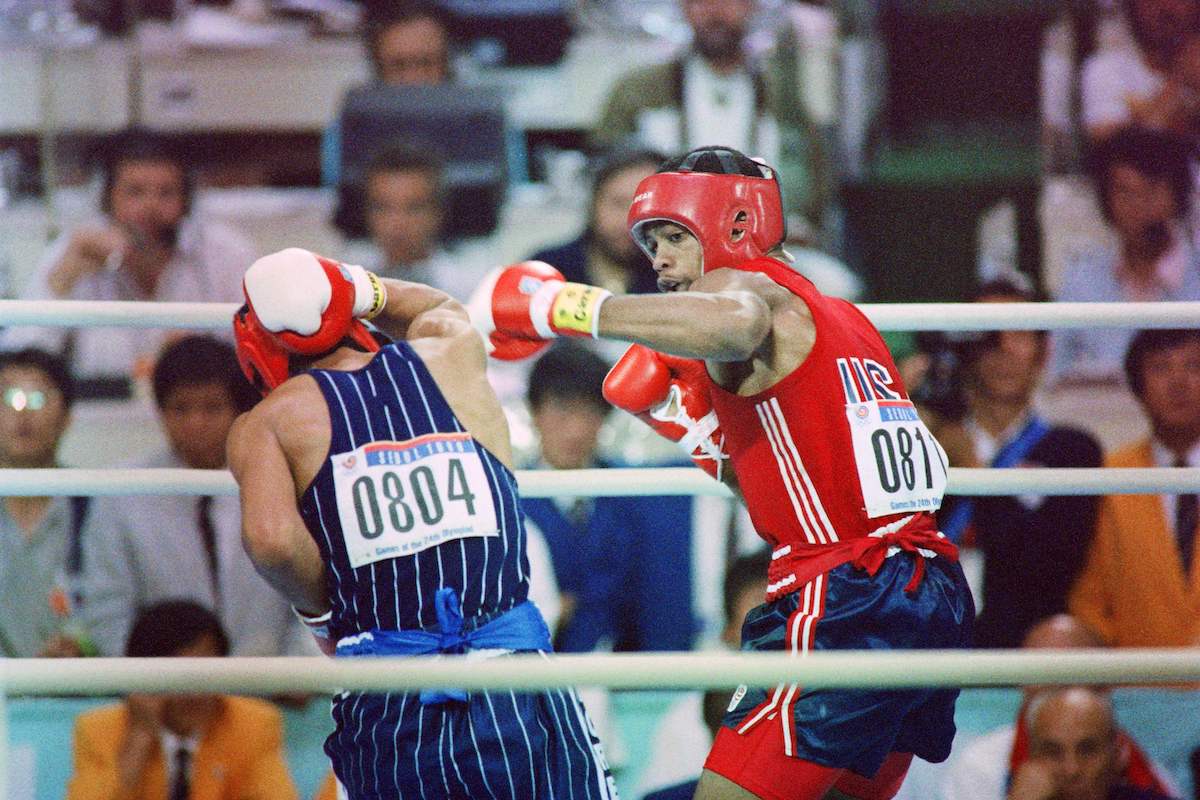Boxing
The Devastating Way Roy Jones Jr. Lost the Gold Medal at the 1988 Olympics

Roy Jones Jr. was one of the most successful boxers of his generation. Like many fighters, he had a good amateur career that included going for a gold medal at the Olympics. He represented America at the 1988 Summer Games in Seoul. It looked like he would bring home the gold. It didn’t end up that way though, as Jones lost in a devastating way. Here’s how it went down.
Roy Jones Jr. at the 1988 Olympics
RELATED: George Foreman Concerned About Mike Tyson and Roy Jones Jr.
When The Guardian ranked its top 50 stunning Olympics moments, Jones made the list at No. 14, but not for a good reason. The boxer competed in the light-middleweight division in Seoul, making it to the gold medal match rather easily. The up-and-coming 19-year-old needed just two minutes to dispose of his opponent in his opening match.
Then, Jones won some unanimous decisions to make it to the semifinal. There, British fighter Richie Woodhall gave him more of a challenge, but all the judges still gave Jones the victory. South Korean Park Si-hun also made it to the final in his homeland (less impressively). He won his first match by a referee stoppage, then went to decisions in his next three bouts.
He won unanimously in the third round and the semifinal, but Park’s fourth-round match was a 3-2 split decision in his favor. (Many spectators thought his Italian opponent Vincenzo Nardiello should’ve won. Nardiello was so upset that he had to be dragged from the ring after the results.)
Jones’ gold medal match
RELATED: Is Olympic Sprinter Oscar Pistorius Still in Prison for Killing His Girlfriend?
The time came for the two finalists to step into the ring and meet for the gold medal. It wasn’t much of a match, with Jones dominating the bout; he landed 86 punches, while Park hit just 32. The Korean native had two standing eight-counts on him, and the ref gave him two warnings.
Even NBC’s punch recorder had the match as a runaway for the American, scoring the rounds 20-3, 30-15, and 36-14 for Jones. The majority of the judges didn’t agree with the assessment, though, as Park won the gold medal in a 3-2 split decision.
When the ruling was announced, Park seemed embarrassed and referee Aldo Leoni seemed disgusted with the judging, whispering to Jones he couldn’t believe they did that to him. Jones still seemed surprised at the result at the medal ceremony, later saying after they put the silver medal around his neck, he “took it right off” and never wore it.
The aftermath of Roy Jones Jr.’ fight

The three judges who awarded the fight to Park were suspended for six months pending an investigation but were cleared of wrongdoing by the International Boxing Association (AIBA). Evidence came to the forefront several years later that Korean boxing authorities had bribed the judges, with the “manipulation” extending into the AIBA’s executive ranks.
Even Leoni would support the claims, revealing that an Argentinian colleague had been offered cash by Korean boxing authorities. Despite all of that evidence, the IOC concluded its investigation in 1997 by ruling “there is no evidence of corruption in the boxing events in Seoul.” Because of that, Jones never received the gold medal he deserved from the 1988 Olympics.
After that controversial match, Jones went on to be arguably the best pound-for-pound fighter of the ’90s. Park, meanwhile, retired from the sport after the Seoul Olympics and never turned pro. He earned a bachelor’s degree in physical education and spent some time as a high school teacher before becoming a boxing coach.











